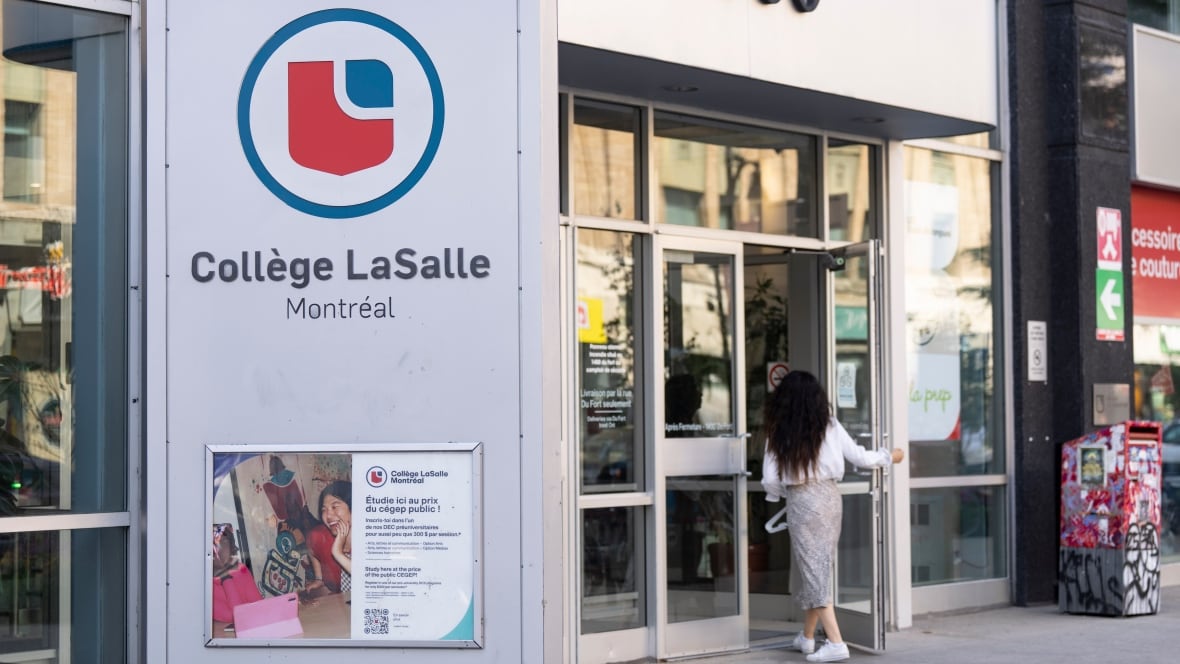Education
LaSalle College Faces Backlash After Changing Student Status

Less than a month before the beginning of the academic year, LaSalle College in Montreal has informed dozens of students that they are being reclassified from full-time to part-time status. This drastic change is a response to compliance issues with Quebec’s language reform, specifically the requirements of the Charte de la langue française. The college’s decision has left many students, including Alex Abraham, grappling with uncertainty regarding their educational and career aspirations in the province.
Abraham, who was set to enter the second year of his network management program, described the notification he received last week as “a devastating blow.” Upon learning of the change through an email, he expressed his shock, stating, “We all came here with lots of expectations and dreams.” The shift to part-time status means that Abraham, along with other affected students, will lose eligibility for Canada’s post-graduation work permit, significantly impacting their ability to work off-campus.
Impact on Students and Compliance Challenges
According to LaSalle College, approximately 90 students are impacted by this decision, which is limited to the fall semester. College spokesperson Caroline Gervais explained that the move was necessary to ensure compliance with government-imposed quotas on English-language vocational programs. These quotas were introduced to regulate the number of students enrolled in such programs, leading to substantial fines for the institution. During the 2024-25 academic year, LaSalle exceeded its quota by 1,066 students, resulting in a fine of $21,113,864, compounded by an earlier fine of $8.7 million for the same infraction, bringing the total debt to nearly $30 million.
Gervais noted that the college is challenging these fines through a civil suit in Quebec’s Superior Court. The lawsuit highlights that approximately 70 percent of students enrolled in English-language vocational programs are international students like Abraham, who relocated from India in search of better opportunities. “The standard of living is good here in Canada compared to India,” he remarked, emphasizing his commitment to learning French and integrating into Quebec’s culture.
Students Seeking Clarity Amid Confusion
While Abraham was aware of the college’s financial predicament, he did not anticipate that his full-time status would be altered. He expressed frustration over the sudden change, stating, “How can I meet my expenses?” The college’s email indicated that while there were resources available for full-time students, government caps hindered their ability to maintain enrollment levels.
Gervais acknowledged that various factors, such as student performance and changes in academic pathways, contributed to the adjustments in enrollment status. Nevertheless, she clarified that not all affected students had failed classes or deviated from their programs. In Abraham’s case, the college confirmed that his academic performance was not a factor in the decision.
In an effort to provide clarity to the affected students, LaSalle College arranged a meeting with representatives from Immigration Canada. Abraham hopes this meeting will offer answers regarding the rationale behind the changes. He stated, “I have the right to know the reason,” expressing concern that the college may be using these adjustments as a means to avoid further fines.
As the start of the academic year approaches, the situation remains tense for those caught in this unexpected limbo. The repercussions of LaSalle College’s decisions highlight the broader challenges faced by educational institutions in navigating regulatory constraints while striving to support their student communities.
-

 Science1 week ago
Science1 week agoMicrosoft Confirms U.S. Law Overrules Canadian Data Sovereignty
-

 Technology1 week ago
Technology1 week agoGoogle Pixel 10 Pro Fold Specs Unveiled Ahead of Launch
-

 Technology1 week ago
Technology1 week agoWorld of Warcraft Players Buzz Over 19-Quest Bee Challenge
-

 Science5 days ago
Science5 days agoChina’s Wukong Spacesuit Sets New Standard for AI in Space
-

 Health6 days ago
Health6 days agoRideau LRT Station Closed Following Fatal Cardiac Incident
-

 Science1 week ago
Science1 week agoXi Labs Innovates with New AI Operating System Set for 2025 Launch
-

 Lifestyle6 days ago
Lifestyle6 days agoVancouver’s Mini Mini Market Showcases Young Creatives
-

 Science1 week ago
Science1 week agoInfrastructure Overhaul Drives AI Integration at JPMorgan Chase
-

 Technology1 week ago
Technology1 week agoHumanoid Robots Compete in Hilarious Debut Games in Beijing
-

 Top Stories1 week ago
Top Stories1 week agoSurrey Ends Horse Racing at Fraser Downs for Major Redevelopment
-

 Technology1 week ago
Technology1 week agoNew IDR01 Smart Ring Offers Advanced Sports Tracking for $169
-

 Health6 days ago
Health6 days agoB.C. Review Urges Changes in Rare-Disease Drug Funding System
-

 Technology5 days ago
Technology5 days agoDragon Ball: Sparking! Zero Launching on Switch and Switch 2 This November
-

 Business6 days ago
Business6 days agoCanadian Stock Index Rises Slightly Amid Mixed U.S. Markets
-

 Science1 week ago
Science1 week agoNew Precision Approach to Treating Depression Tailors Care to Patients
-

 Technology1 week ago
Technology1 week agoGlobal Launch of Ragnarok M: Classic Set for September 3, 2025
-

 Technology1 week ago
Technology1 week agoFuture Entertainment Launches DDoD with Gameplay Trailer Showcase
-

 Education5 days ago
Education5 days agoParents Demand a Voice in Winnipeg’s Curriculum Changes
-

 Technology1 week ago
Technology1 week agoInnovative 140W GaN Travel Adapter Combines Power and Convenience
-

 Business1 week ago
Business1 week agoNew Estimates Reveal ChatGPT-5 Energy Use Could Soar
-

 Health5 days ago
Health5 days agoRideau LRT Station Closed Following Fatal Cardiac Arrest Incident
-

 Business5 days ago
Business5 days agoAir Canada and Flight Attendants Resume Negotiations Amid Ongoing Strike
-

 Health1 week ago
Health1 week agoGiant Boba and Unique Treats Take Center Stage at Ottawa’s Newest Bubble Tea Shop
-

 Business1 week ago
Business1 week agoSimons Plans Toronto Expansion as Retail Sector Shows Resilience










